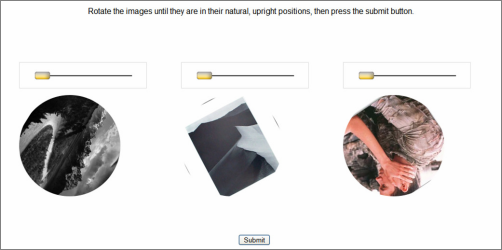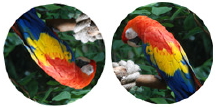Sunday, April 19, 2009
Google Researches New Captcha Approach In Which Users Rotate Images Upward
Google researchers released a paper [PDF] which explores a new approach to Captchas. Instead of the user entering a string of letters and numbers to prove they’re not a bot – with traditional Captchas often showing visuals that are hard to decipher not only for bots, but also humans – this approach asks users to orient a picture into an upright-facing position. Google shows off below 3 sample images:
A |
|
Google says this set is easy to orient upwards for humans, but bots may also succeed here because they may use face detection. |
|---|---|---|
B |
|
This is the most useful approach: for humans, adjusting to an upwards direction is easy, but for bots it’s not. |
C |
|
Sample C is again less useful because it’s hard for humans, too, to adjust this one correctly. |
The researchers from Google (Rich Gossweiler, Maryam Kamvar and Shumeet Baluja) explain:
To obtain candidate images for our CAPTCHA system, we start with a large repository and then remove images that a computer can successfully orient as well as those that are difficult for humans to orient.
For example, all of the images returned from an image-search start as potential candidates for our system. We then use a suite of automated orientation detectors to remove those that can be set upright by a computer. (...) We then apply a social feedback mechanism to verify that the remaining images are easily oriented by humans. In order to identify images that people cannot orient, we compute the variance of users’ submitted orientations and reject images which have a high variance. (...)
Our CAPTCHA technique achieves high success rates for humans and low success rates for bots, does not require text entry, and is more enjoyable for the user than text-based CAPTCHAs.
Below is an example interface, where one needs to slide 3 images into their “natural, upright positions”:

For comparison, a traditional text-based Captcha, as used in Google’s tests:

When Google tested their new Captcha approach internally, however, not all of the 16 users were happy. “68.75% of users (11 users) preferred rotating images, and 31.25% of users (5 users) preferred deciphering text,” the research states. One user said, “I prefer [deciphering text] since it requires simple keyboard inputs which are absolute. With rotating pictures I found myself continually making fine adjustments to make them perfectly upright, therefore taking a slight bit longer to accomplish. Also, I’m much more familiar with [deciphering text] since it’s what most internet portals use for security purposes.”
[Thanks Manoj, who saw it at Stephen Shankland’s report on CNet!]
>> More posts
Advertisement
This site unofficially covers Google™ and more with some rights reserved. Join our forum!



